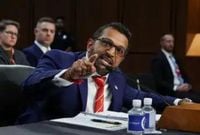On September 20, 2025, the spotlight turned sharply onto FBI Director Kash Patel, whose handwritten note—brimming with self-affirming phrases—set social media abuzz and fueled a broader debate about the high-stakes congressional hearings focused on the late Jeffrey Epstein’s case files. The note, written in blue ink on a notepad emblazoned with the FBI’s logo and the title “Director Patel,” was first brought to wide attention after journalist Aaron Rupar shared an image of it, quickly racking up over 1.6 million views and sparking a wave of public mockery and commentary.
The note’s content, as reported by Daily Mail, read like a personal pep talk: “Good fight with Swalwell. Hold the line. Brush off their attacks. Rise above the next line of partisan attacks.” This simple collection of motivational phrases, intended perhaps to steady Patel before a contentious appearance on Capitol Hill, instead became a lightning rod for criticism and ridicule. Social media users wasted no time in lampooning the FBI chief’s apparent need for self-encouragement, with one user quipping, “Lmfao, he’s writing words of affirmation to himself,” and another remarking, “What an absolute loser having to write himself motivational notes because no one loves him.”
The viral post, which quickly spread far beyond the Beltway, also drew comparisons to professional wrestling. “Bro writing WWE match cards instead of testimony notes. ‘Good fight with Swalwell’ sounds like a bad episode of C-SPAN UFC,” joked another commenter, highlighting the theatrical nature of Washington’s political skirmishes. Some even poked fun at Patel’s custom notepad, suggesting it revealed a “troll mentality.” Others saw the note as a sad reflection of the pressures facing public officials, with one user commenting, “Lmao this is so sad. It’s like he’s hyping himself up in the mirror before the hearing.”
But the handwritten note was just the tip of the iceberg. Beneath the surface, the congressional hearing itself—where Patel faced off against Democratic lawmakers—was fraught with tension and political drama. According to Hindustan Times, much of the heat centered on Patel’s exchanges with California Congressman Eric Swalwell, who pressed the FBI director about the Justice Department’s reluctance to release any grand jury records pertaining to Epstein, the disgraced financier whose death and alleged crimes have haunted the American political landscape for years.
Swalwell’s line of questioning zeroed in on whether the records contained references to former President Donald Trump, a known associate of Epstein. The congressman asked pointedly if Patel had ever informed then-Attorney General Pam Bondi that Trump’s name appeared in the files. Patel, clearly bristling at the insinuation, shot back, “Your fixation on this matter and baseless accusations that I’m hiding child pedophiles is disgusting.” His retort only seemed to escalate the intensity of the hearing, with Swalwell repeatedly pressing for a direct answer and Patel responding with sarcasm. At one point, Patel snapped, “Why don’t you try to spell it out if you’re going to mock me? Use the alphabet: A, B, C, D, E, F.”
The spectacle didn’t end there. As reported by CNN, the hearing also featured a heated clash between Patel and Congressman Adam Schiff, another Democrat deeply involved in oversight of intelligence and law enforcement agencies. Their exchange underscored the deep political divisions that have come to define investigations into Epstein’s activities and the government’s handling of related documents. Schiff’s persistent questioning and Patel’s defensive posture illustrated the broader partisan battle lines over transparency, accountability, and the lingering shadow of Epstein’s connections to powerful figures.
For many observers, the viral note became a symbol of the extraordinary pressure and scrutiny facing public servants embroiled in controversies with national and even global implications. The fact that the note was written on official FBI stationery, with the title “Director Patel” printed just beneath the bureau’s iconic black-and-white logo, only added fuel to the fire. Critics saw it as evidence of an embattled official trying to psych himself up for a bruising political fight, while supporters argued it was a humanizing glimpse into the private anxieties of those in high office.
On social media, the reactions ranged from derision to empathy, but few denied the spectacle’s entertainment value. The intersection of personal vulnerability, partisan theatrics, and the ever-present specter of Epstein’s crimes created a combustible mix that dominated headlines and online discourse. As one commentator put it, “I mean…who hasn’t written ‘hold the line’ to themselves at a congressional hearing while covering for the largest pedophile sex traffickers of modern times??” The biting sarcasm was emblematic of a public increasingly skeptical of official narratives and hungry for transparency.
The hearing itself, meanwhile, revealed little new information about the contents of the Epstein files, but it did expose the raw nerves and deep mistrust that now characterize relations between Congress and federal law enforcement. Patel’s repeated denials of any wrongdoing—particularly his insistence that he was not hiding evidence or protecting powerful interests—did little to assuage critics. The fact that he felt compelled to write himself a motivational note, some argued, was a sign of just how fraught the situation had become.
For Patel, the episode may ultimately be remembered less for the substance of his testimony and more for the viral moment that captured the internet’s imagination. The blue-inked affirmations, meant to steel his resolve, instead became a meme—a symbol of both the personal toll of public service and the unforgiving nature of modern political discourse. As the dust settles, the questions raised by the hearing remain unresolved: What secrets, if any, are still hidden in the Epstein files? And can the FBI and Congress move beyond partisan bickering to provide the answers the public demands?
In the end, the saga of Kash Patel’s handwritten note serves as a reminder that, in the age of social media, even the most private moments can become public property—scrutinized, mocked, and debated by millions. The intersection of personal vulnerability and political theater has rarely been more vivid, and the stakes, both for those in power and the public they serve, have never been higher.




